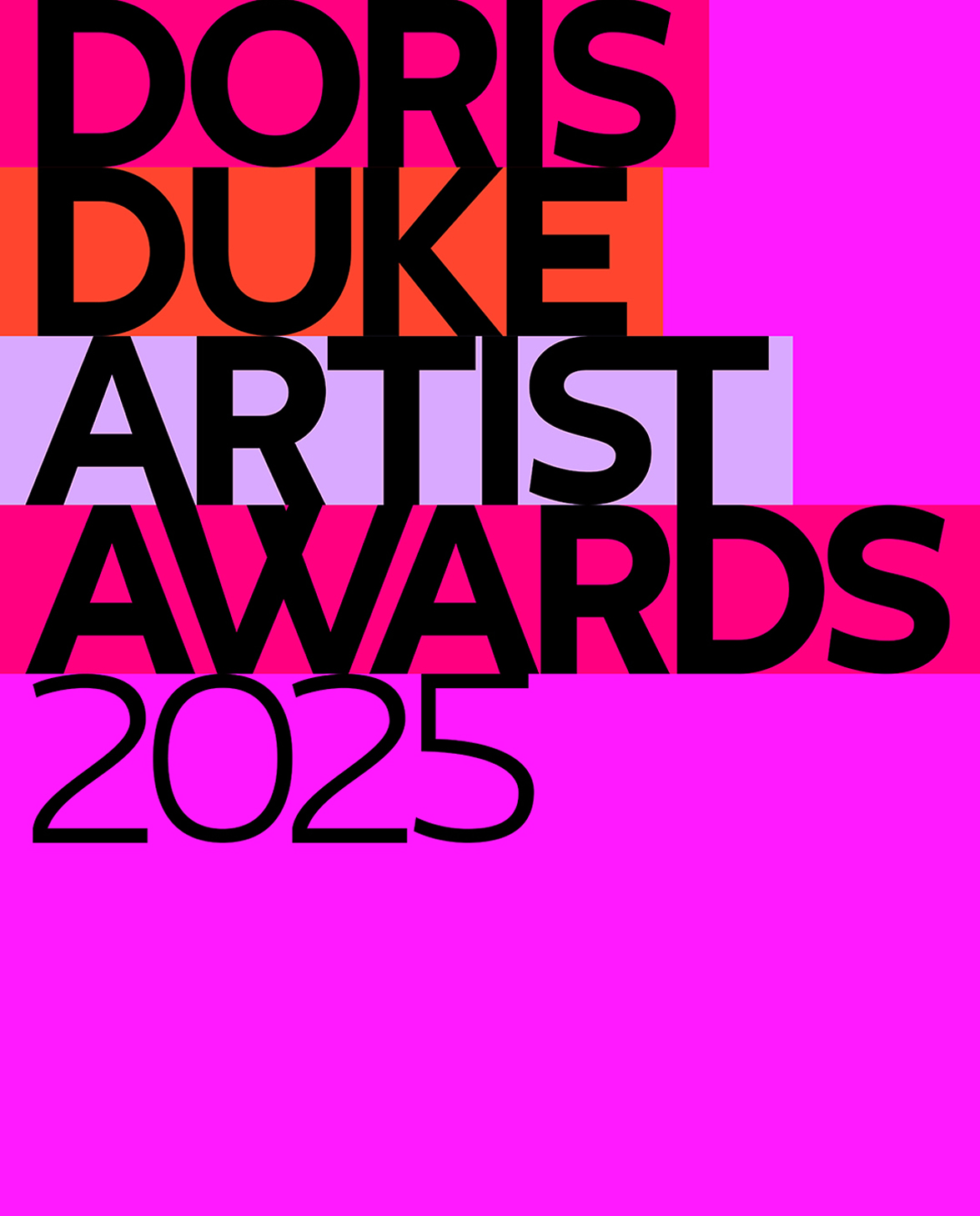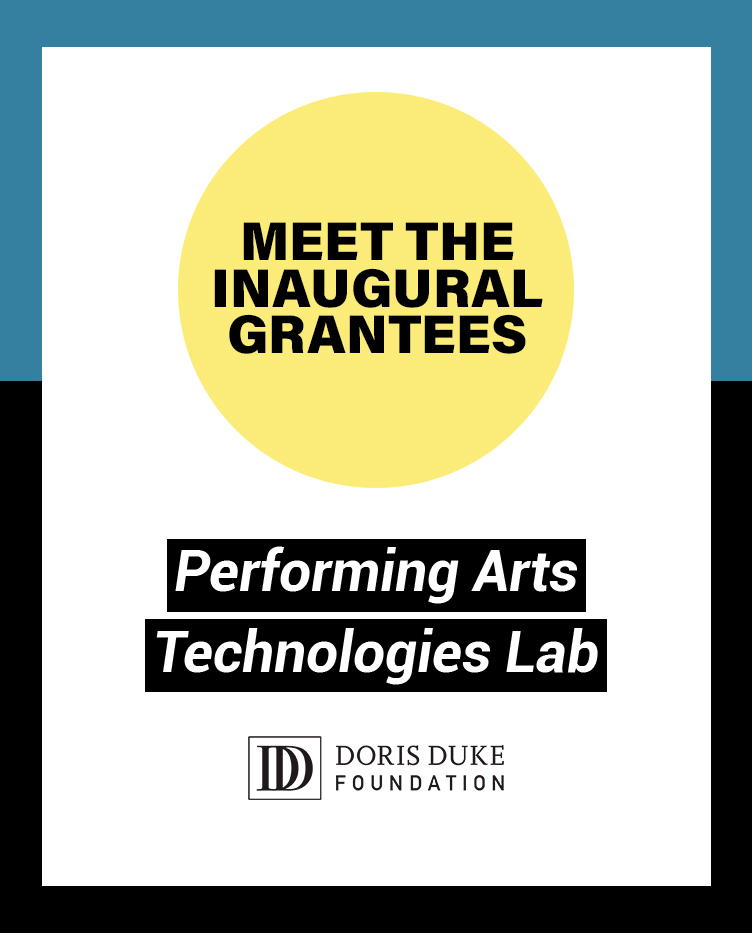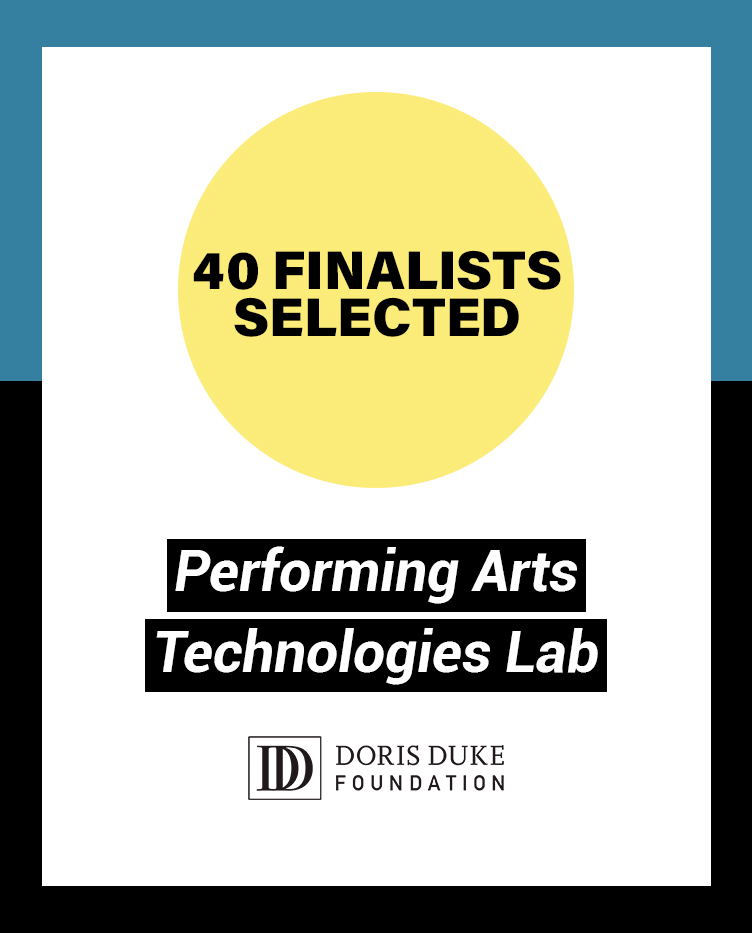Back to the request for applications webpage.
I am confused about the deadline for applications as the website and request for proposals state that it is May 6, but I saw a press release which stated the deadline was April 2.
We can confirm that the deadline for applications is May 6. We will accept applications until midnight ET that day. Please disregard the April 2 date.
Do I need a fiscal sponsor when applying or only if accepted into the lab?
If you are applying as an individual, a collective or an entity that is not a registered 501(c)(3), you do not need a fiscal sponsor to apply, but you will need one if your project is selected for funding. The Doris Duke Foundation (DDF) can only award grants for this program to organizations that have 501(c)(3) tax exempt status. A fiscal sponsor is a nonprofit organization that agrees to assume legal and financial oversight for a charitable activity or project that does not have its own tax-exempt status. Fiscal sponsorship fees will be an allowable expense as part of a grant budget and the need for this cost will be considered in determining grant size.
If you want to learn more about what a fiscal sponsor does, the process of engaging one and/or about some of the organizations that offer this service, here is a list of resources. The foundation does not require grantees to work with specific fiscal sponsors, so we encourage you to explore your options. We can address questions about fiscal sponsorship as potential grantees have them. Please email us at artsRFP@dorisduke.org.
I am an individual applying for this grant. In the section of the application form called “Add New Organization,” what should I enter since I am not affiliated with an organization?
If you are applying as an individual and are not associated with an organization, please select the option “Entering an Organization Name” and then enter your full legal name in the box below. That field can accommodate individual names and organization names.
What if I have an idea about how to use digital technology to transform performing arts working methods (or related topics), but I do not know how to implement this idea? Can I expect the foundation to facilitate access to technical expertise for my idea?
We ask that grantees have the skills needed to imagine complex projects, to communicate an idea, and to help identify the right collaborators for implementation. Experience in or knowledge of how to design, use or implement the technology is not a requirement for this grant.
What if I am a technician with a technical application in the performing arts, but I do not currently have an artistic collaborator or institutional partner?
We can help connect you to possible collaborators or partners, though in principle we will resist a “matchmaking” approach pairing artists with technicians. Historically, this type of approach has produced imbalances in power between artistic and technical perspectives. Therefore, we will advise on possible collaborators and help enable the conditions for such collaborations to emerge organically. We do encourage technicians applying without firsthand knowledge of the performing arts to articulate in their application why they believe their work to be a good match for the fields of theater, contemporary dance and/or jazz.
What if I am an artist whose work pushes the boundaries of the form to critically engage the social and political conditions for digital systems, but who does not engage those technologies directly in their work?
We are very excited about ideas that might conceptually engage the lab in this way. For that reason, we welcome those projects that might be about the topics and technical systems that we have outlined in the above Request for Applications. We believe that incorporating rich critical perspectives will be the benefit of a diverse group of grantees and have the potential to expand learning opportunities and exchange around field building.
What if I use complex digital systems to support my storytelling or artmaking, but those technologies are not the central focus of my work?
Technology does not have to be the topic of your work for you to apply. DDF recognizes that technology emerged as the topic of many performing arts and digital technology experiments from the 1960s and that this lineage continues to the present day. We crucially believe, however, that technology is a tool and that the lab must reframe the conversation and increase broad access to such emerging technologies in order to generate dynamic impact across the field of performing arts. The use of technology in service of artistic production will be the focus of the lab. We therefore encourage projects that engage production techniques in creative ways in order to tell the most engaging stories.
What if I have no experience working with digital technology?
DDF is not able to provide comprehensive technical training, especially since we anticipate each project to require distinct approaches. Production and technology advisers to the lab will be able to consult on where to find technical training and/or support and how to identify which technical systems are best for specific ideas. DDF will also provide demo and other general learning opportunities such that grantees have exposure to different possibilities in the technological realm. Initial financial support for feasibility exploration can be used to support technical trainings and/or the engagement of collaborators with knowledge needed to produce a project idea.
What if I have an idea for a digital solution for theater, contemporary dance or jazz, but do not have interest in implementing it myself?
We encourage you to apply and, if you are selected, would look forward to working with you to consider who could partner with you to implement such a solution. There may also be opportunity for those who are not selected to participate in the lab to join the larger network of learning and exchange that DDF is organizing to support the lab grantees. We will review proposals holistically and will aim to support individual projects in the specific ways that they need. We also encourage you to seek out webinar and individual meeting opportunities with DDF in advance of the application deadline to discuss your idea and related possibilities.
What if I am interested in using technology to make in-person performance more accessible?
DDF recognizes that the disability performing arts community has long pioneered advancements in the integration of technology in the performing arts to make the disciplines more accessible. We hope to receive such project proposals in response to this Request for Applications.
DDF also recognizes that access to technology, whether broadband or specific devices and trainings, can be geographically or economically prohibitive. We welcome applications that address these needs of our field and their audiences.
What is the timeline of Phase 1, and will I need to make frequent trips to New York City?
Over 5 months, there will be two 2-day convenings in New York City and virtual meetings with advisors and consultants. Your travel, accommodation, and related costs will be covered for the convenings according to DDF’s travel policy, which will be distributed to grantees prior to travel. We will work with grantees to be sure that any questions or comments are addressed.
Do all collaborators need to attend the convenings?
No, the project lead or a nominated team member can attend as a representative.
Is my project still eligible if it's already in development, such as a tool or artistic work?
Yes, if it is in the development and testing phase. However, Phase 1 of the lab does not include the project’s implementation or presentation.
Is the lab only open to U.S. applicants?
The applicant must be a U.S. person or organization, but collaborators and/or partners can be non-U.S. The application should make clear how the project would support the performing arts field in the U.S. if part of the activity happens elsewhere.
Can the Performing Arts Technologies Lab apply to social infrastructure?
Yes, all approaches impacting the performing arts and technology field are welcome.
Can I be involved in two projects as a collaborator?
Each applicant can submit only one proposal for the Performing Arts Technologies Lab. However, it is possible to be a collaborator in two applications if you are not the lead applicant.
What should be included in the cost estimate and what period does this cover?
Please include all foreseeable costs incurred during the 5-month ideation, development, and testing period in your total cost estimate. Costs of project implementation should not be included.
Are indirect costs for a project taking place within a university context allowable in the cost-estimate?
Yes. However, indirect costs are capped at 6%.
Is funding guaranteed for Phase 2 if my project is accepted into Phase 1 of the lab?
No, only selected projects from Phase 1 will proceed to Phase 2.
Seeking a grant?
View our latest funding opportunities and open competitions.


